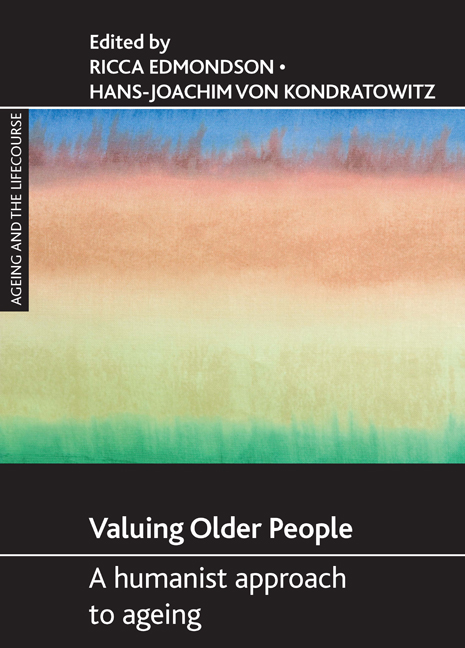Book contents
- Frontmatter
- Contents
- List of tables and figures
- Notes on contributors
- Acknowledgements
- Foreword
- Introduction
- Part One Religion, spirituality, cultural resources and creating meaning
- Part Two Norms, values and gerontology
- Part Three Ageing and wisdom? Conflicts and contested developments
- Afterwords
- Index
- Available titles in the Ageing and the Lifecourse series
Introduction
Published online by Cambridge University Press: 05 July 2022
- Frontmatter
- Contents
- List of tables and figures
- Notes on contributors
- Acknowledgements
- Foreword
- Introduction
- Part One Religion, spirituality, cultural resources and creating meaning
- Part Two Norms, values and gerontology
- Part Three Ageing and wisdom? Conflicts and contested developments
- Afterwords
- Index
- Available titles in the Ageing and the Lifecourse series
Summary
Establishing a humanistic gerontology – challenges and opportunities
The meaning of ‘humanistic gerontology’
Humanistic concerns build on a rich tradition that has developed through much of recorded history. This tradition was famously summarised in Cicero's quotation from Terence, intended to underline the fundamental connectedness of all human beings: ‘I am a man, and nothing human is alien to me’ (Cicero, 1991: I.30). In different guises, this tradition remained influential until well into the 20th century. The term ‘humanist gerontology’ was introduced to recent research by American scholars such as Moody and Manheimer. It stresses the fact that human activities (including gerontology itself) cannot be understood without taking seriously the different ideals, values, norms and goals that give actions their intelligibility and meaning. This brings to centre stage the practical knowledge that older people cannot be treated as alien by those who write about them. ‘Valuing older people’ demands comprehending them as people, not treating them as strangers whose predicaments are foreign to those of others. It requires gerontologists to work towards studies of ageing that incorporate this stance in a fundamental way.
A primary aim in this collection is therefore to explore a diversity of aspects of ageing while guided by the need to understand the people at the centre of enquiry, with their values and purposes. Contributions include longitudinal studies of the way in which people struggle to develop the meanings of their life courses and the resources they draw on; qualitative studies of ways in which individuals can be helped by cultural frameworks in different national settings to interpret their own ageing in constructive ways; and studies of social and institutional pressures and deficits which make this harder. Quantitative survey material is used to enhance conjectures about meanings that older people in varying circumstances attach to their relationships with their children, or about the willingness of others to allow for constructive public provision for older age. A study of older people in nursing homes is predicated on the question, could a person really pursue the aims and purposes of a normal human being in these circumstances? All this work focuses on human ideas and practices – and the limits they encounter.
- Type
- Chapter
- Information
- Valuing Older PeopleA Humanist Approach to Ageing, pp. 1 - 20Publisher: Bristol University PressPrint publication year: 2009



